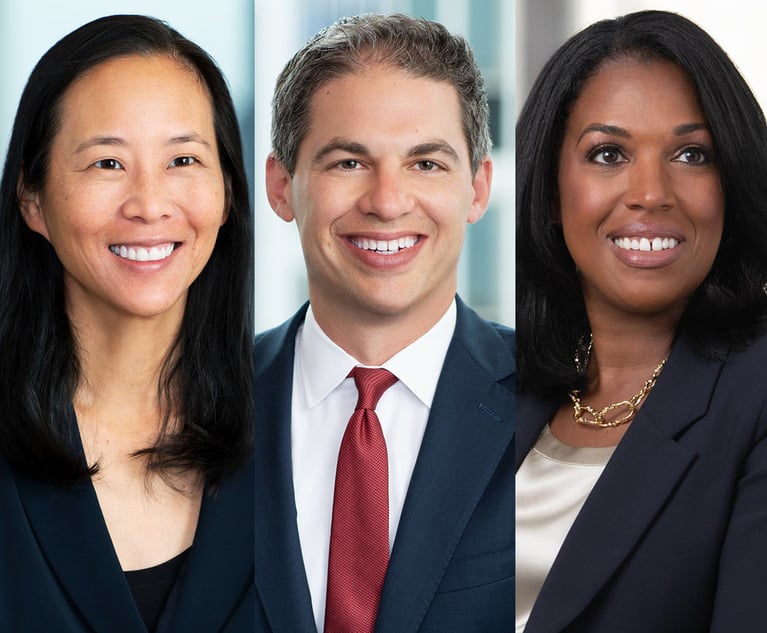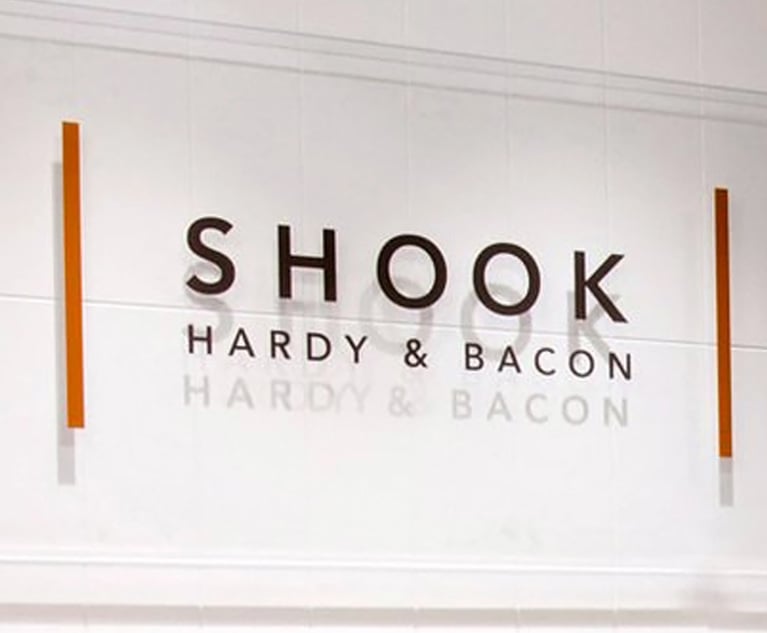 Photo: Yarygin/Shutterstock.com
Photo: Yarygin/Shutterstock.com Federal Trademarks Still Difficult to Obtain for Cannabis Companies
Ed Weisz, a partner at Cozen O'Connor in New York, said the federal patent law allows for patents to be placed on plants. So different strains of cannabis can be registered with the U.S. Patent and Trademark Office.
February 11, 2019 at 10:13 AM
5 minute read
The original version of this story was published on Corporate Counsel
Registering a federal trademark is still difficult for cannabis companies, according to intellectual property attorneys who work with the industry.
Ed Weisz, a partner at Cozen O'Connor in New York, said the federal patent law allows for patents to be placed on plants. So different strains of cannabis can be registered with the U.S. Patent and Trademark Office. He explained getting a strain of cannabis patented does not present any unique problems other than the issues every kind of product goes through in the middle of the patent application process.
“The trademark space is trickier than the patent space,” Weisz explained. “Primarily that's due to the fact that patent laws allow people to apply for and obtain plant patents. You can in effect obtain patents on a new cannabis strain or something.”
He explained federal law still prohibits people from obtaining a trademark for “illegal activities.”
“Because of that and because of the federal law still considers cannabis to be illegal activity and illegal products, you have a situation where it's approved at certain state levels but it's still not approved at the federal level,” Weisz said.
However, Nuzayra Haque, the principal attorney at NH Legal in Los Angeles, said when she started working on cannabis-related IP issues, the attorneys at the USPTO would not even have a conversation about trademarking a cannabis company.
She said when she first started working with cannabis companies she had to submit several trademark applications with the USPTO and work with the examining attorneys to figure out what parts of the cannabis business could and could not be trademarked.
“It was over time that we had to work with the USPTO and get them comfortable with the idea that cannabis businesses are not shady, dodgy businesses like they used to be,” Haque said.
She said over the past three years the examining attorneys have seen it as a burgeoning industry and are a lot more comfortable to grant companies federal trademark registration. She said it took several conversations and legal briefings to get examining attorneys to understand that not every part of the cannabis business has to do with selling.
“It has been a struggle on both ends,” she explained. “Convincing the clients that they need to get IP protection if they want to be taken seriously as a brand and on the other hand it was working out with the USPTO on how can we get these registrations.”
She said there is still some work to be done in terms of there being less of a back-and-forth between the USPTO and cannabis companies.
“But at least now we're at a point where we can talk about seriously getting registrations and talk about protecting intellectual property of cannabis brands,” Haque said.
Right now, things like paraphernalia cannot be trademarked because it is something that helps in the consumption of marijuana.
“As far as goods are concerned, CBD goods. You can have a realistic chance of getting those registered as long as they are not edibles,” Haque explained.
Weisz said his advice to cannabis companies is to get a trademark at the state level. He also said companies may want to adopt a strategy where they get a trademark on something else they are selling.
“A strategy may be to file [a trademark application] on tangential products,” Weisz explained.
Although, Michael Brubaker, the founder and principal of Cannapatents in Seattle, said he doesn't recommend companies get a federal trademark.
“It would be really nice if they had a federal trademark for their company, but unless I can see that they have a business that they can separate from cannabis, I don't encourage them to do it because the USPTO will go and look you up on Facebook,” Brubaker explained. “They're going to look at your company and if your company is doing business in cannabis, as long as there is a trace of it, they're going to see it and they're going to say sorry.”
He did say, however, he does encourage cannabis companies to have state trademarks on their brands.
Even the issue of obtaining a state trademark has come a long way, Haque explained. She said when California first allowed medical marijuana legally in 1996, it was difficult to have a trademark application approved.
“The state didn't want to give it to you,” she explained. “In California it was very, very rigid. The classes were predetermined classes and if your goods and services didn't fall under one of those classes, which there was no class for cannabis, your mark is not getting registered.”
This content has been archived. It is available through our partners, LexisNexis® and Bloomberg Law.
To view this content, please continue to their sites.
Not a Lexis Subscriber?
Subscribe Now
Not a Bloomberg Law Subscriber?
Subscribe Now
NOT FOR REPRINT
© 2025 ALM Global, LLC, All Rights Reserved. Request academic re-use from www.copyright.com. All other uses, submit a request to [email protected]. For more information visit Asset & Logo Licensing.
You Might Like
View All

Meet the Long Island Judge Tapped to Be US Attorney for Eastern District of New York
3 minute read
Appeals Court Rejects Trump Attempt to Delay Friday Sentencing
Trending Stories
Who Got The Work
Michael G. Bongiorno, Andrew Scott Dulberg and Elizabeth E. Driscoll from Wilmer Cutler Pickering Hale and Dorr have stepped in to represent Symbotic Inc., an A.I.-enabled technology platform that focuses on increasing supply chain efficiency, and other defendants in a pending shareholder derivative lawsuit. The case, filed Oct. 2 in Massachusetts District Court by the Brown Law Firm on behalf of Stephen Austen, accuses certain officers and directors of misleading investors in regard to Symbotic's potential for margin growth by failing to disclose that the company was not equipped to timely deploy its systems or manage expenses through project delays. The case, assigned to U.S. District Judge Nathaniel M. Gorton, is 1:24-cv-12522, Austen v. Cohen et al.
Who Got The Work
Edmund Polubinski and Marie Killmond of Davis Polk & Wardwell have entered appearances for data platform software development company MongoDB and other defendants in a pending shareholder derivative lawsuit. The action, filed Oct. 7 in New York Southern District Court by the Brown Law Firm, accuses the company's directors and/or officers of falsely expressing confidence in the company’s restructuring of its sales incentive plan and downplaying the severity of decreases in its upfront commitments. The case is 1:24-cv-07594, Roy v. Ittycheria et al.
Who Got The Work
Amy O. Bruchs and Kurt F. Ellison of Michael Best & Friedrich have entered appearances for Epic Systems Corp. in a pending employment discrimination lawsuit. The suit was filed Sept. 7 in Wisconsin Western District Court by Levine Eisberner LLC and Siri & Glimstad on behalf of a project manager who claims that he was wrongfully terminated after applying for a religious exemption to the defendant's COVID-19 vaccine mandate. The case, assigned to U.S. Magistrate Judge Anita Marie Boor, is 3:24-cv-00630, Secker, Nathan v. Epic Systems Corporation.
Who Got The Work
David X. Sullivan, Thomas J. Finn and Gregory A. Hall from McCarter & English have entered appearances for Sunrun Installation Services in a pending civil rights lawsuit. The complaint was filed Sept. 4 in Connecticut District Court by attorney Robert M. Berke on behalf of former employee George Edward Steins, who was arrested and charged with employing an unregistered home improvement salesperson. The complaint alleges that had Sunrun informed the Connecticut Department of Consumer Protection that the plaintiff's employment had ended in 2017 and that he no longer held Sunrun's home improvement contractor license, he would not have been hit with charges, which were dismissed in May 2024. The case, assigned to U.S. District Judge Jeffrey A. Meyer, is 3:24-cv-01423, Steins v. Sunrun, Inc. et al.
Who Got The Work
Greenberg Traurig shareholder Joshua L. Raskin has entered an appearance for boohoo.com UK Ltd. in a pending patent infringement lawsuit. The suit, filed Sept. 3 in Texas Eastern District Court by Rozier Hardt McDonough on behalf of Alto Dynamics, asserts five patents related to an online shopping platform. The case, assigned to U.S. District Judge Rodney Gilstrap, is 2:24-cv-00719, Alto Dynamics, LLC v. boohoo.com UK Limited.
Featured Firms
Law Offices of Gary Martin Hays & Associates, P.C.
(470) 294-1674
Law Offices of Mark E. Salomone
(857) 444-6468
Smith & Hassler
(713) 739-1250









